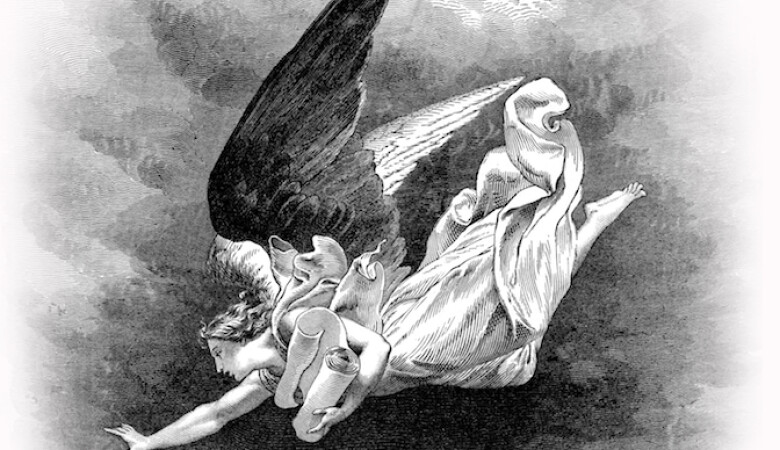Hell is Eternal... But Escapable (Revelation Sermon 27 of 49)
November 26, 2017 | Andy Davis
Revelation 14:9-11
Salvation, Judgment, Hell
Introduction
One of the hardest sermons I have ever preached — a very different kind of text than we are studying today — was the beautiful, magnificent soaring doxology at the end of Romans 11. After unfolding the doctrine of the Gospel, Paul ends by celebrating the greatness of God.
Romans 11:33-36 says, “Oh, the depths of the rich is the wisdom and the knowledge of God, how unsearchable His judgments and His past beyond tracing out. Who has known the mind of the Lord, or who has been His counselor? Who has ever given to God that God should repay Him? For from Him and through Him and to Him are all things. To Him be the glory forever and ever."
I felt the weight of the text. I did not think I had the oratorical, exegetical, or homiletical skills to rise up to such an incredible text, with its joyful celebration of the wisdom of God in the Gospel. I thought it was beyond anything that I could do.
As we look at Revelation 14:9-11, I have the same problem with an opposite text. My emotions and experiences do not help me capture the weightiness of our subject with adequate words, emotion and tone. That is, that Hell is a place of eternal conscious torment — a fact taught clearly in Scripture.
I have prayed that God would enable me to speak in such a way that you would feel the weight of the truths in Revelation 14:9-11, and that He would open your heart and mind, especially for those who are outside Christ, that you would be warned and flee to Christ while there's time.
A number of years ago, I assisted in a funeral for a woman whom I did not know well. I do not remember the exact circumstances — she may have been the grandmother of one of the young people involved in our urban ministry. They asked if they could use the church for her funeral, and if I would read Scripture.
It is a tradition at funerals in some communities to have a time of testimony to honor the person who died. That is not our pattern but they asked for permission and I agreed. People stood up and spoke from their place in the pews to share their thoughts and memories of their loved one.
One woman, the sister of the deceased, stood in her turn and stated, “Not everyone who dies goes to heaven.” Wow — total silence. “My sister didn't love the Bible, didn't love Jesus, didn't go to church. I can't lie, I have no great confidence that she's in Heaven right now. But we're still alive, and this funeral is a warning to all of us to flee to Christ while there's time.” Then she sat down.
Her simple, clear, short, truthful speech convicted me; I would not have spoken so plainly. I resolved that when given the opportunity to preach at future funerals, I would not fail to speak this clear, basic message: “It is appointed to man to die once, and after that, to face judgment.” [Hebrews 9:27]
The Bible reveals two destinations, Heaven or Hell. Today’s text describes Hell. It is one of the most challenging doctrines in the Bible, the idea that a righteous and holy God would consign people for eternity to conscious torment. This doctrine is the very reason that many in our world turn in disgust and unbelief from the God of the Bible. They cannot imagine a God who would choose infinite punishment for sins that were committed in space and time by finite people. Apart from Scripture, we can have no conception of Hell. Scripture teaches us about these invisible realities.
My understanding of Hebrews 11:1, based on what the Greek says, is this: “Faith is the assurance of things hoped for, [but also] the conviction of things not seen.” The word “conviction” relates to something that brings you to a point of realization of guilt, of the fact and weight of sin. Thus, faith has both assurance, a sweet, positive side, looking ahead with hope to the good things that God has promised, but also conviction, eyesight to see into the invisible spiritual realms to understand the threat or the warning for us as sinners. It is by faith we can see these invisible spiritual realities.
Hell as eternal conscious torment is an uncomfortable topic, and people tend to turn away from it as a doctrine. In 2015, in an interview, Pope Francis leaned toward annihilation for the lost sinner: “What happens to that lost soul? Will it be punished, and how? The response of Francis is distinct and clear: There is no punishment but the annihilation of that soul. All the others will participate in the beatitude of living in the presence of the Father. The souls that are annihilated will not take part in that banquet; with the death of the body their journey is finished.”
Obviously, this topic is one of the most difficult to face, but we cannot avoid doing so. Revelation 14:9-11 enables us to understand in part what the Bible teaches about it. Ironically, I believe that a healthy biblical meditation on Hell has the power to make Christians happier than ever. It is a paradox but it is true. The more we meditate on what we deserve but have been delivered from, the more a number of things happen:
Your thankfulness to God and to Christ will greatly increase. Your perspective on your own present sufferings will be helpful. You will turn away from murmuring and complaining. You will live a life of great joy and gratitude to God for what He has done in delivering you.
Apart from understanding this doctrine of eternal conscious torment, the words “savior” and “salvation” have little meaning. They imply a grave danger, not intended to apply to minor help. If we do not grasp our grave of danger, we do not see the need for a savior or salvation. But the Bible teaches that we do need a savior and we do need salvation. Praise God, it is available through faith in Christ now; today is still in the realm of the Day of Salvation that God has offered to all of us.
Unfolding Revelation 14:9-11
Context: The Terrors of the Antichrist
We are in the middle of Revelation, a book which pulls the veil back on the invisible spiritual realm. We see, above all, Jesus Christ and His glory, and we also see the future — “what must soon take place.”
We have been walking through this book chapter by chapter. In our current section, we now understand the spiritual force of evil in the heavenly realms. Satan, the dragon, has a vigorous hatred for the people of God — the saints. He presently attacks and accuses day and night, but in the future his hatred for and his attack against the people of God will greatly escalate.
He will bring forth his masterpiece of deception, the Antichrist, also called the Beast from the Sea, in Revelation 13. John does not use the word “antichrist” directly in Revelation but does in 1 and 2 John — it means “substitute Christ”, or one who takes the place of Christ. 2 Thessalonians 2 calls him the man of sin or the man doomed to destruction. Daniel calls him “the little horn..”
He will be a world ruler. According to Revelation 13, he will appear to be miraculously resurrected from a fatal wound and come back to life, thus winning the confidence of the world. Prior to this “miracle”, the world will suffer seven judgments initiated by trumpet blasts, described in Revelation 8-9. The ecology of the earth is ravaged — all the green grass and a third of the trees are burned up; a third of the oceans turn to blood; a third of the living creatures in the sea dies; and a third of the fresh water is poisoned.
We can imagine that in such a state of upheaval in the geopolitical realm, leaders will emerge. Eventually this one leader will come forth and take over the world. Revelation 13:7-8 says, “…it was given authority over every tribe, people, language and nation. All inhabitants of the earth will worship the beast…” Not only will he have control over the military and government, but he will be the focus of worship as well.
Revelation 13 also reveals a powerful false prophet called the Beast from the Earth, who will lead this new worldwide religion of worship for the Antichrist. He will build or create or craft a miraculous supernatural image, an idol, in honor of the Antichrist, and will use the machinery of the worldwide government, the police state, to compel worship.
At the end of Revelation 13, we have these words, “The second beast was given power to give breath to the image of the first beast, so that the image could speak and cause all who refused to worship the image to be killed. It also forced all people, great and small, rich and poor, free and slave, to receive a mark on their right hands or on their foreheads, so that they could not buy or sell unless they had the mark, which is the name of the beast or the number of its name."
Christians, those whose names have been written from before the foundation of the world in the Lamb’s Book of Life, will not partake in this false religion. They will not bow down and worship the idol or receive the mark of the beast, so they will be the focus of the Antichrist’s persecution and hatred. The prophet Daniel says he will kill many of them. He will wage war on them, and will win for a short time.
The Angelic Warnings
That is the context for Revelation 14. In the middle of the chapter, we see three angels, who are sent, one after the other, to warn people of the grave of danger of God’s imminent judgment.
Revelation 14:6-7 says, “Then I saw another angel flying in midair, and he had the eternal gospel to proclaim to those who live on the earth-- to every nation, tribe, language and people. He said in a loud voice, ‘Fear God and give him glory, because the hour of his judgment has come. Worship him who made the heavens, the earth, the sea and the springs of water.’”
Immediately a second angel follows, crying out, “Fallen! Fallen is Babylon The Great…” Babylon is that system of human culture and government and society united in rebellion against God, following the “lust of the eyes, the lust of the flesh, and the boastful pride of life.” Revelation 14:8: “Fallen! Fallen is Babylon the Great, which made all the nations drink the maddening wine of her adulteries.”
The third angel is the focus of this sermon. Revelation 14:9-11 says, “A third angel followed them and said in a loud voice: "If anyone worships the beast and his image and receives his mark on the forehead or on the hand, he, too, will drink of the wine of God's fury, which has been poured full strength into the cup of his wrath. He will be tormented with burning sulfur in the presence of the holy angels and of the Lamb. And the smoke of their torment rises for ever and ever. There is no rest day or night for those who worship the beast and his image, or for anyone who receives the mark of his name.”
The people of that time, the final generation, will be under extreme pressure to worship the beast and his image, and to receive the mark of the beast in order to buy or sell. There are positive inducements for people to do so willingly — the Antichrist will be a compelling figure who will have, to some degree, rescued the world from economic disaster and the inability to eat or drink or even to survive under the previous judgments. Because of this, they will have an affection for him already. In addition, he is skillful but devious speaker and politician, attractive and compelling in his bearing. Adding to his persona, he is able to perform signs and wonders — his own resurrection from the dead will be one of many.
There are also negative inducements to worship the beast and obey his edicts — those who do receive the mark cannot buy or sell, and eventually will be put to death. A police state with supernatural, demonic powers to hunt down dissidents will engender overwhelming compulsion to bow down and worship. A great fear of the Antichrist and the police state and the government will fall on people worldwide.
But there is something infinitely worse than that which should supplant the temporary fear of Antichrist. Jesus said in Luke 12:4-5, “I tell you, my friends, do not be afraid of those who kill the body and after that can do no more. But I will show you whom you should fear: Fear him who, after the killing of the body, has power to throw you into Hell. Yes, I tell you, fear him.”
Pastors, evangelists and missionaries who say, “I don't want to scare people into Heaven” are misguided at best. I would be delighted to scare people into Heaven, into an eternity in the presence of our Lord. Jesus did not mind scaring people. He admonished that we should fear God who can destroy us forever in Hell rather than fearing humans and human governments which can kill only the body and do no more after that. God is forcing a choice and warning the waverers even among believers: “Don't do it; fear God. Be willing to die for Christ.”
The pressure to take the mark will be unimaginable. Those who receive it do so willingly — it is a decisive spiritual act, not inadvertent. No one will stumble into it; there are no secret operatives or ninjas working for the Antichrist sneaking in and marking people while they sleep. It is a conscious decision that will be made in terms of one’s will in his heart to worship an idol.
The angel says, “If anyone receives the mark, he too will drink of the wine of God's fury.” The word “too” is interesting. It could refer to the second angel’s pronouncement: people are already drinking from the wine of the adulteries of Babylon The Great, and they will drink from the cup of God’s wrath “too.” Or it could refer to the many generations of the damned who had no opportunity to receive the mark of the beast because they died long before he came on the scene. They will receive the same torment as those who do receive it.
The Wine of God’s Fury
Regardless of the meaning of the word “too”, Hell is real. Verse 10 says, “…he, too, will drink of the wine of God's fury, which has been poured full strength into the cup of his wrath.” The metaphor is one of completely absorbing, drinking in, being immersed in. The drink is described as the wine of God’s fury. Wine influences ones mind and heart.
Wrath is a strong immediate reaction from God — vehement, hot, passionate. Fury is more long-term indignation — a smoldering memory of a lifetime of rebellion by His creatures. It is long-standing, historical and intense. Used together, they greatly magnify the impact. It has been a settled fact in the mind of God for a long time that He will at some point unleash His rage like a burning forest fire or the sun. He holds back until the appointed time when He will set aside His patience.
Notice the strength of it. “…he, too, will drink of the wine of God's fury, which has been poured full strength into the cup of his wrath.” Nothing is held back. It is undiluted, not mixed. In ancient times, people would mix wine with fruit juice or water to dilute its impact. This wine of God’s fury will be full strength, with maximum impact.
It is staggering to begin to comprehend the omnipotence and omniscience of God combined to focus like a laser beam on the destruction of an individual, like a laser beam focused down on a single individual. There is nothing more terrifying than that.
Verse 10 makes a simple prediction: “He will be tormented with burning sulfur in the presence of the holy angels and of the Lamb.” This is surely the Lake of Fire from Revelation 20. The torment with burning sulfur, or fire and brimstone, similar to Sodom and Gomorrah, is constantly before the holy angels and the Lamb, Jesus Christ. The angels and Jesus are watching. This implies that there is no squeamishness, embarrassment, shame, or pity about this among the angels or with Jesus. It will not be done in a corner. God is not ashamed of the righteous display of His justice and holiness in His punishment of the wicked any more than He was ashamed to destroy Sodom and Gomorrah with fire and brimstone or the ancient world with a flood.
Isaiah 66:24 points to another audience. Isaiah says, “And they will go out and look upon the dead bodies of those who rebelled against me; their worm will not die, nor will their fire be quenched, and they will be loathsome to all mankind.” That implies that the redeemed are able to see it as well, which makes sense. Why would God hide it from His children? By then we can handle it and God is not ashamed of it. He wants us to know.
Revelation 21:4 says, “There will be no more death, mourning, crying or pain.” They will observe it without any crying, emotional pain, or anguish. Our experience in heaven will not in any way be diminished by knowing some of the damned. If anything, it will feed our thankfulness and humility. We will realize we all deserved to be there; the only difference was the grace of God.
Eternal Hell
Verse 11 speaks of the eternality of Hell, “And the smoke of their torment rises for ever and ever. There is no rest day or night for those who worship the beast and his image, or for anyone who receives the mark of his name.” Eternal conscious torment, the fact that there is absolutely no escape in the future, is one of the most difficult concepts for many to accept.
Like the hymn “Amazing Grace” says, “When we’ve been there 10,000 years, bright, shining as the sun, we’ve no less days to sing God’s praise than when we first begun.” The mirror image of that is true in reference to Hell — no fewer days after 10,000 years. There is no future escape; the escape is now, today. “Today, if you hear His voice, do not harden your hearts.” This is the time to escape.
Understanding the Doctrine of Hell
Definition
We benefit from looking wider to understand more of what the New Testament teaches about Hell, and what we are to do with that knowledge. Wayne Grudem says, “Hell is a place of eternal conscious punishment for the wicked.” Jonathan Edwards, in his famous 1741 sermon, “Sinners in the Hands of an Angry God”, said:
“O sinner! consider the fearful danger you are in: it is a great furnace of wrath, a wide and bottomless pit, full of the fire of wrath that you are held over in the hand of that God, whose wrath is provoked and incensed as much against you, as against many of the damned in Hell. You hang by a slender thread, with the flames of divine wrath flashing about it, and ready every moment to singe it, and burn it apart; and you have no interest in any Mediator, and nothing to lay hold of to save yourself, nothing to keep off the flames of wrath, nothing of your own, nothing that you ever have done, nothing that you can do, to induce God to spare you one moment more."
Edwards struggled to find language to describe this reality. English literature classes in secular high schools across the country study this sermon as literature, typically for the purpose of debunking or mocking it to some degree. But why did he struggle with these images, with this language?
John Piper says, “What high school student is ever asked to come to grips with what really is at issue here? If the Bible is true, and if it says that someday Christ will tread his enemies like a winepress with anger that is fierce and almighty, and if you are a pastor charged with applying Biblical truth to your people so that they will flee the wrath to come, then what would your language be? What would you say to make people feel the reality of texts like these? Edwards labored over language, he labored over images and metaphors because he was so stunned and awed at the realities he saw in the Bible. Edwards believed that it was impossible to exaggerate the horror and reality of Hell. High school teachers would do well to ask their students the really probing question, ‘Why is it that Jonathan Edwards struggled to find images for wrath and Hell that shock and frighten, while contemporary preachers try to find abstractions and circumlocutions that move away from concrete, touchable Biblical pictures of unquenchable fire and undying worms and gnashing of teeth?’ If our students were posed with this simple, historical question, my guess is that some of the brighter ones would answer: ‘Because Jonathan Edwards really believed in Hell, but most preachers today don’t.’”
Natural Repugnance
There is a natural human repugnance to this topic. Mark Twain compared the Jehovah of the Old Testament to the Jesus of the new and he said, “It’s a misunderstanding to think of Jehovah as a fire-breathing wrath-filled God, but Jesus as gentle, meek and mild. Jesus was a thousand billion times crueler than ever [Jehovah] was in the Old Testament... Meek and gentle? By and by we will examine that popular sarcasm by the light of the Hell which he invented.”
Charles Darwin said this, “I can hardly see how anyone ought to wish Christianity to be true for if so, the plain language of the text seems to show that the men who do not believe, and this would include my Father, Brother, and almost all my best friends, will be everlastingly punished. And this is a damnable doctrine.” I would respond that wishing it to be true or not will not change the reality of it.
Clark Pinnock, a Canadian theologian who strayed far from his evangelical roots, said, “I was led to question the traditional belief in everlasting conscious torment because of moral revulsion and broader theological considerations, not first of all on scriptural grounds. [Do you hear that?] It just does not make any sense to say that a God of love will torture people forever for sins done in the context of a finite life.... It’s time for evangelicals to come out and say that the biblical and morally appropriate doctrine of Hell is annihilation, not everlasting torment.”
Even John Stott, who in every other respect was a faithful expositor of the Word, was drawn in by this. He said, “Emotionally, I find the concept [of eternal conscious torment] intolerable and do not understand how people can live with it without either cauterizing their feelings or cracking under the strain.”
More recently, Rob Bell published a book titled hopefully Love Wins: A Book About Heaven, Hell and the Fate of Every Person Who Ever Lived. Kevin DeYoung summarized it in this way, “Here’s the gist: Hell is what we create for ourselves when we reject God’s love. Hell is both a present reality for those who resist God and a future reality for those who die unready for God’s love. Not quite ready when you die. Hell is what we make of Heaven when we cannot accept the good news of God’s forgiveness and mercy. But Hell is not forever. God will have his way. How can his good purposes fail? Every sinner will turn to God and realize he has already been reconciled to God, in this life or in the next.... In the end, love wins.”
Christ’s Emphasis on Hell
The Bible does not teach these things. Jesus Christ taught more clearly and voluminously on Hell than anyone else because He came first to warn us of it, then to drink it for us to save us from it.
Matthew 5:21-22, the Sermon on the Mount: “You have heard that it was said to the people long ago, ‘You shall not murder, and anyone who murders will be subject to judgment.’ But I tell you that anyone who is angry with a brother or sister will be subject to judgment. And anyone who says, ‘You fool!’ will be in danger of the fire of Hell.”
Mark 9:43-48: “You have heard that it was said, You shall not commit adultery, but I tell you that anyone who even looks at a woman lustfully has already committed adultery with her in his heart. If your hand causes you to sin, cut it off. It is better for you to enter life maimed than with two hands to go into Hell, where the fire never goes out. And if your foot causes you to sin, cut it off. It is better for you to enter life crippled than to have two feet and be thrown into Hell. And if your eye causes you to sin, pluck it out. It is better for you to enter the kingdom of God with one eye than to have two eyes and be thrown into Hell, where ‘their worm does not die, and the fire is not quenched.’”
Matthew 8:11-12: “I say to you that many will come from the east and the west, and will take their places at the feast with Abraham, Isaac and Jacob in the kingdom of heaven. But the subjects of the kingdom will be thrown outside, into the darkness, where there will be weeping and gnashing of teeth.”
Matthew 13:41-42, the parable of the weeds and the wheat: “The Son of Man will send out his angels, and they will weed out of his kingdom everything that causes sin and all who do evil. They will throw them into the fiery furnace, where there will be weeping and gnashing of teeth. Then the righteous will shine like the sun in the kingdom of their Father."
Luke 16:23-24, the rich man and Lazarus: “In Hell, where he was in torment, he looked up and saw Abraham far away, with Lazarus by his side. So he called to him, ‘Father Abraham, have pity on me and send Lazarus to dip the tip of his finger in water and cool my tongue, because I am in agony in this fire.’”
The Doctrine of Hell
From these and other passages, we have the doctrine of Hell regarding its purpose, its percentage, its environment, and its effects.
What is the purpose of Hell? Hell is punishment for unrepentant sinners who have not claimed Christ as their Savior, for both sins of commission — things that we did and should not have done — and sins of omission — things that we should have done and did not do. Revelation 21:8 says, “But the cowardly, the unbelieving, the vile, the murderers, the sexually immoral, those who practice magic arts, the idolaters and all liars-- their place will be in the fiery lake of burning sulfur. This is the second death.”
Note the sin of omission in Matthew 25:41-42: “Then he will say to those on his left, ‘Depart from me, you who are cursed, into the eternal fire prepared for the devil and his angels. For I was hungry and you gave me nothing to eat, I was thirsty and you gave me nothing to drink…’” and so on.
What percentage of people will be in Hell? Jesus said in Matthew 7:13-14, “Enter through the narrow gate. For wide is the gate and broad is the road that leads to destruction, and many enter through it. But small is the gate and narrow the road that leads to life, and only a few find it.” “Many” and “only a few” imply that the overwhelming majority of people are on the road to destruction.
What is the environment of Hell? It is likened to a lake of eternal fire. Some say that is a metaphor; if so, then a metaphor for what? “Metaphor” is merely a word, which is always a lesser experience than the thing itself, so that does not ease the reality.
What are the effects of Hell? First, every good and perfect gift that anyone has ever experienced, including common grace blessings, comes from God and indicates that God Himself is present. All of that will be removed because God’s presence is removed. This is important for unsaved friends who think they want to go to Hell because they think people they enjoyed as friends in this life will be there. Blessings of friendship and joy and celebration and happiness will be absent, leaving only bitterness and anger and suffering and hatred. All lawful and unlawful pleasures that they lived for and traded their souls for on earth will be gone.
Those in Hell are cast out, separated from everything good. 2 Thessalonians 1:8-9 says, “He will punish those who do not know God and do not obey the gospel of our Lord Jesus. They will be punished with everlasting destruction and shut out from the presence of the Lord.” They are shut out, as the five foolish, unprepared virgins find themselves in Matthew 25:11-12. They knock on the door and cry, “‘Sir! Sir!' they said. ‘Open the door for us!’ But he replied, ‘I tell you the truth, I don't know you.’”
We are responsible to bear the truth to those who speak with a very light-hearted attitude about and preference for Hell.
Second, conscious torment is taught in Scripture. In the parable of the rich man and Lazarus, the rich man was aware of where he was and knew his own history. Abraham told him in Luke 16:25, “…remember that in your lifetime you received your good things, while Lazarus received bad things, but now he is comforted here and you are in agony.” He was aware that he had brothers that he wanted to warn and was regretful about things. That is conscious torment.
Third, it is everlasting. The fire never goes out. Revelation 14:11 says, “And the smoke of their torment rises for ever and ever. There is no rest day or night."
Fourth, it is a place of regret. Matthew 13:50 says, “…there shall be wailing and gnashing of teeth.”
Fifth, it is utter darkness. 2 Peter 2:17 “Blackest darkness is reserved for them.” Matthew 22:13 “…cast him into the outer darkness.”
A Foolish Idea
We must refute a foolish sentiment: “God does not send anyone to Hell.” I hear it often from believers who affirm the reality of Hell but try to protect God from people’s aversion to the topic, as though God needed defending. They say it is not really God who sends people to Hell, that they go there of their own free will, that all of their lives, they have chosen to go separate ways from God, and God is in the end giving them what they have always wanted. That does not line up with the things we have studied today. No one will send himself to Hell on judgement day. When the reality of its horrors is revealed, they must be tied hand and foot and cast there by the angels. Many passages teach that. No one willingly goes there simply because they prefer to go there rather than be with God and with the saints.
Applications
Motive for Salvation
First, this is a motive for fear and repentance and to come to Christ. We should not despise this as a motive — it is right to fear and flee the wrath to come into the arms of Jesus. According to several Scriptures, “The fear of the Lord is the beginning of wisdom.” Again from the hymn “Amazing Grace,” “’Twas grace that taught my heart to fear, and grace my fears relieved.” Every non-Christian in the sound of my voice should be motivated to flee to Christ now upon considering the realities of Hell. You do not know how much longer you have in this life, and after that it will be too late.
D.L. Moody tells a story in a sermon he preached on Hell: A man emerging from a saloon, getting on his horse, asked a deacon of the church who was passing by, “How far is it to Hell?” He did not know how to answer. The man rode off and the deacon turned and walked away, when he heard a sudden noise in the opposite direction. He turned back to see the horse rear and unseat the man, who broke his neck and died. For that man, the answer to his question was “Not far at all.”
This morning, as I drove here, I came upon a very bad accident. We were probably the second car on the scene; it must happened no more than 90 seconds before we got there. A somewhat heavyset man was holding his chest sitting off to the side holding his chest. I worried about his heart condition, but he said the seat belt and the air bag got him. His left front wheel was completely severed and lying apart from the body of the car with a part of the axle and a bunch of grease. I wheeled that out of the road and then sat with the man until the police and the ambulance came. The point is, he did not imagine that would happen to him this morning. I did not guess when I left my house that I would be present to talk to and pray for an accident victim. Thankfully, he is a believer and was on his way to worship at his church.
The point is, we do not know how long we have, so this is an inducement to flee to Christ, to run to our only refuge. Jesus died on the cross in our place that we might have eternal life. Hell is eternal, but it is not life. It is, however, escapable. You need only to turn away from the idea of your own goodness and righteousness and good works, and in faith, repent of your sins and trust in Jesus. See Him as your Savior.
I do not know language I can use to plead with you any more plainly. Do not put it off, do not think that you need more information, do not be afraid of what your unsaved friends will say. Do not fear anything except God. Today is the day of salvation.
Gratitude for Salvation
Second, if you have fled to Christ, then let this be an infinite source of gratitude to God for saving you. This Holy God, who is a consuming fire, is the Father of the prodigal son. He has reached out to you and welcomed you back and forgiven all of your debts. “There is [for you] therefore now no condemnation,” since you are in Christ Jesus. Be forever thankful to Him.
I say this lovingly: If you complain of bodily aches and pains, stop it. Seek medical help; take your medicines. But do not let infirmities dominate your mind. God has delivered you from Hell. If you complain about of temporary setbacks and difficulties in the financial realm, stop it. God has delivered you from Hell. If you complain of feelings of isolation and rejection and loneliness that you feel the church of Christ should be but is not alleviating, stop it. God has delivered you from Hell. You have been delivered from an eternity of bodily pain, financial burden and isolation. It hard for some of us to imagine, but there will be no introverts, no recluses, in heaven. We will be very social there; you have been delivered from ultimate isolation. This doctrine has paradoxical power to make you eternally happy.
Charles Dickens’ third ghost in A Christmas Carol shows Ebenezer Scrooge that he would die. He seems shocked by the fact and wants to deny it. The musical film version of the story with Albert Finney, Scrooge, goes further than Dickens seemed to intend in that scene. The third ghost shows Scrooge an image of himself in Hell. When he wakes up after that ghost departs, the night is over, and it is Christmas day. He hugs his bed post and realizes he is not in Hell but very much alive. He begins lavishly giving and doing good things to as many people as he could find. That seems an appropriate response, a surge of joy and happiness and energy, to the realization of what God has done for us in Christ. You are free from condemnation and all your needs are met; be grateful and live to serve others.
Worship for Salvation
Third, worship Christ for his courage. This enables us, as the hymn reflects, to “Go with me to dark Gethsemane” to see him recoil from a cup as he was praying on the night he was betrayed. The cup contained exactly what we have studied this morning — Hell, with all its characteristics and implications. The Father was offering Him the cup of Hell to drink in Gethsemane.
Jesus prayed three times, “My Father, if it is possible, may this cup be taken from me. Yet not as I will, but as you will… if it is not possible for this cup to be taken away unless I drink it, may your will be done.” [Matthew 26:39, 42] That is the most courageous and loving act any human has ever done in history. The more we meditate on the torments of Hell, the more we understand the courage of Jesus. He drank that cup to its bitter dregs for us on the cross.
Motive for Sanctification
Fourth, this is a motive for personal holiness. Matthew 5:27-29, “You have heard that it was said, ‘Do not commit adultery.’ But I tell you that anyone who looks at a woman lustfully has already committed adultery with her in his heart. If your right eye causes you to sin, gouge it out and throw it away. It is better for you to lose one part of your body than for your whole body to be thrown into Hell.”
Is fear of Hell a valid motivation for Christians to be holy and not sin sexually? Jesus would say yes. Do not worry about analyzing that theologically. Flee sin. If some aspect of your life, whether electronic entertainment or pleasure or internet involvement or anything, is causing you to sin, cut it out. It is better to eliminate it than to go to Hell. If you think, “I am okay with going to Hell if it means I can continue living this way,” do not be deceived. Paul plainly warns in Ephesians 5:3-4, 6, “But among you there must not be even a hint of sexual immorality, or of any kind of impurity, or of greed, because these are improper for God’s holy people. Nor should there be obscenity, foolish talk or coarse joking, which are out of place, but rather thanksgiving… Let no one deceive you with empty words, for because of such things God’s wrath comes on those who are disobedient. Therefore do not be partners with them.” So yes, fear of Hell is a proper motivation to take specific steps of practical holiness.
Sorrow for the Lost and Support Missions
Fifth, sorrow for the lost. You are surrounded every day by people whom Jesus said are on that broad highway to destruction, to Hell. Ask God to give you a vision, a revelation of what that punishment is. What does wailing and gnashing of teeth look like? What can you do to be grieved and speak up?
Paul said, concerning the unbelieving Jews, Romans 9:1-4 “I speak the truth in Christ-- I am not lying, my conscience confirms it in the Holy Spirit — I have great sorrow and unceasing anguish in my heart. For I could wish that I myself were cursed and cut off from Christ for the sake of my brothers, those of my own race, the people of Israel.”
If you are not there yet, be honest and confess, “I don't have much of a sorrow for the lost, not like I should. God, would you work in my heart so I grieve over the spiritual destination of those who are outside of Christ.” He will move you to zeal and activity in evangelism and missions.
Years ago, Hudson Taylor, a great missionary in the inland regions of China, spoke at a missions conference to motivate complacent Scottish Christians in a large church to get involved in the mission to China. He told them a true story, something that happened to him while he was in Ningpo, China. While traveling on a junk, a type of coastal boat, he met a Chinese man with the Western name of Peter who had spent a little time in England. This man had not come to Christ yet. He was very interested in the gospel that Hudson Taylor was sharing, but he was also struggling with depression and discouragement, and he did not make a commitment to Christ. A short time later on that same trip, he fell overboard.
Hudson Taylor called out to some Chinese fishermen who were fishing with a dragnet to come fish the man out before was too late. One fisherman called back, “It’s not convenient.” Taylor shouted, “Don’t speak of convenience, someone is dying!” They refused, so he offered to pay them the equivalent of $5. “Not enough” they replied. He countered, “I’ll give you everything I have in my pocket.” “How much is that?” “$14,” he answered. They agreed. Within a few moments, they fished Peter up, but it was too late; they could not resuscitate him.
As he told this story, the Scottish Christians that were listening were utterly indignant toward the fishermen who had such a callous attitude. He then replied, “But you are acting like the body is worth more than the soul. What about we who have the gospel message and we are able to deliver people from eternity in Hell, and we do nothing because it's not convenient?”
Evangelism and missions will never be convenient; it will always be costly. I would urge you to look for opportunities at work or on campus to share the gospel and warn others of the judgment that is to come.
Let us be faithful as a church to support missionaries that are on the field right now, through the IMB Lottie Moon Christmas Offering. Support them financially. The needs are great — the cost of having missionary units in the field is greater than ever before. We as a church need to be faithful and sacrificial in sending missionaries to the ends of the earth.
Closing Prayer
Father, this is a difficult, deep, sobering topic, and I pray, Father, that we would be able to feel the weight of the truth of these things in Revelation 14:9-11, that we not shrink back from Him, that we would understand that Jesus drank this for us that we might have eternal life, and that we would give Him thanks, and Father, that we will give You thanks for sending Your beloved Son and pouring out your wrath on Him, our substitute, our lightning rod, that we might be delivered and protected. I pray one more time for any that are here, who walked in this place unconverted, that they would believe in Christ while there is time and trust in Him. O Lord, I pray that You give us a greater zeal than we have ever displayed before for evangelism right here in the Raleigh-Durham area, and then missions to the ends of the earth. We pray in Jesus’ name, amen.






























